The Impact of Inaccurate Criminal Background Checks on Employers and Job Seekers
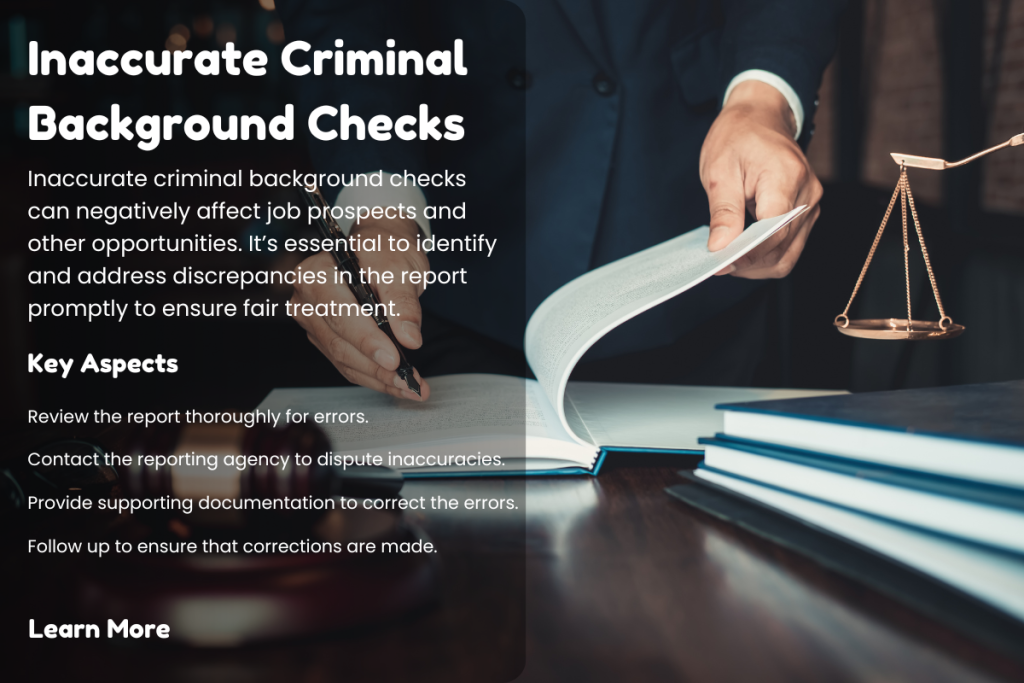
Understanding Inaccurate Criminal Background Checks
Criminal background checks are a fundamental part of modern hiring processes, housing decisions, and legal proceedings. However, the process of background screening is not flawless, and sometimes inaccuracies can occur. These inaccuracies can lead to unintended consequences for both individuals and organizations. In this section, we’ll explore the concept of an inaccurate criminal background check, the common errors that may occur during the process, the causes of inaccuracies, and the serious impacts that result from these errors.
What Is an Inaccurate Criminal Background Check?
An inaccurate criminal background check refers to a situation where the report contains incorrect, misleading, or incomplete information. Inaccuracies in these checks can arise from a variety of sources, leading to significant errors in the background screening process. Such errors can include mismatched records, outdated or missing data, and clerical mistakes.
Criminal background checks are typically used by employers, landlords, and legal authorities to assess an individual’s criminal history and overall suitability for a role, residence, or legal matter. When these checks are inaccurate, individuals may face consequences that are not warranted by their actual criminal history, and employers may make ill-informed decisions that impact their businesses.
Common Types of Inaccurate Background Checks
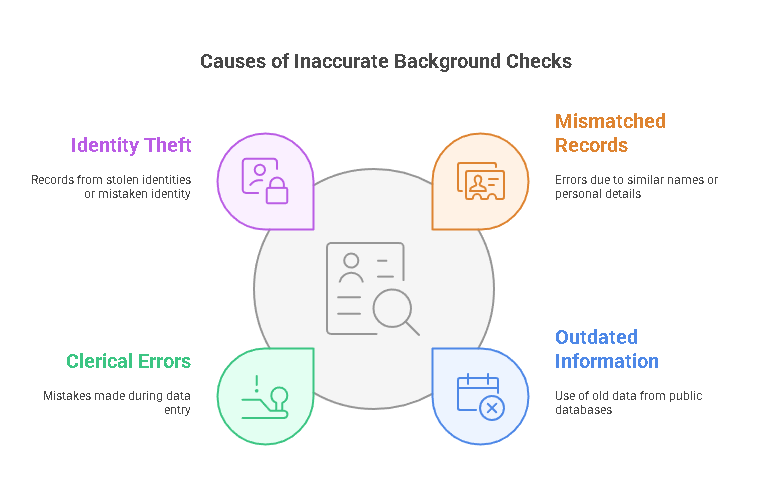
- Mismatched Records: This is one of the most frequent errors in criminal background checks. It occurs when an individual’s name, date of birth, or other personal information is mistakenly associated with someone else’s criminal record. For example, if two people have similar names or live in the same area, the records may be mixed up, leading to false accusations or charges appearing on the wrong person’s report.
- Outdated Information: Criminal background checks rely on the information stored in public databases and law enforcement records. However, these records are not always up-to-date, and outdated information can sometimes appear in the report. This includes old convictions or arrests that have already been expunged, sealed, or dismissed.
- Clerical Errors: Background check companies rely on databases that often require human input for data entry. Clerical errors can occur during this process, such as typing mistakes, which may result in the inclusion of incorrect information.
- Identity Theft or Mistaken Identity: In some cases, a criminal background check can include records from an individual who has had their identity stolen. Alternatively, people with similar names or addresses may be confused for one another, leading to mistaken identity in the background check.
Inaccuracies in criminal background checks may seem trivial at first glance, but they can have far-reaching consequences. The following sections examine the primary causes of these errors.
Causes of Inaccurate Background Checks
The causes of inaccuracies in criminal background checks are diverse and complex. Understanding these causes is important for both individuals and organizations that rely on background checks for decision-making. Below are some of the key factors that contribute to inaccurate criminal background checks:
- Errors in Data Entry and Record-Keeping:
Background check companies typically rely on public records, court documents, and databases to create reports. If the data is entered incorrectly at any stage of the process—whether by court officials, law enforcement, or background check companies themselves—mistakes may be made. For example, a clerk may incorrectly spell a name, causing it to be linked to the wrong individual’s record. - Outdated or Incomplete Data:
Some background check reports may contain outdated or incomplete data due to the time lag in updating records in various systems. For instance, a charge that was dismissed may still show up on a report if it hasn’t been properly expunged or removed from public databases. Additionally, many criminal databases at local, state, and national levels can be slow to update, meaning older cases may not be reflected accurately in background checks. - Jurisdictional Issues:
Different jurisdictions maintain separate criminal records, and errors can arise when these records are not adequately communicated across jurisdictions. A record that is available in one jurisdiction may not be updated or shared with others, leading to an incomplete or incorrect background check. This is particularly problematic when someone has moved between states or countries and their criminal history is spread across multiple systems. - Identity Theft or Mistaken Identity:
Identity theft is a growing concern in the digital age, and individuals may be falsely accused of crimes they did not commit due to stolen personal information. This can lead to an individual’s criminal background report containing offenses they never committed. Additionally, individuals with similar names or addresses may be mistakenly linked to criminal records, further complicating the accuracy of a background check. - Inaccurate Reporting by Employers or Third Parties:
In some instances, employers or third-party companies may fail to report the correct information when conducting background checks. Errors may arise when the reporting party mistakenly records wrong or incomplete details, which then get passed along to the background check company.
These causes demonstrate the complexity of the criminal background check process and the potential for errors at various stages. It’s important to be aware of these causes in order to address and correct inaccuracies when they arise.
Impacts of Inaccurate Criminal Background Checks
The consequences of inaccurate criminal background checks can be devastating for both individuals and organizations. The implications go beyond administrative errors and can result in legal disputes, missed opportunities, and long-lasting reputational damage. Below are some of the key impacts that inaccuracies in criminal background checks can have:
- For Job Applicants:
- Loss of Job Opportunities: A criminal background check with inaccurate information can result in the rejection of job applications. For instance, an individual may be wrongly flagged for a crime they didn’t commit, leading to a lost opportunity.
- Reputational Damage: Even if a person’s criminal record is inaccurate, the stigma of having a criminal history can harm their professional reputation. Inaccurate reports may prevent them from being considered for jobs they are qualified for.
- Legal and Financial Consequences: Some job applicants may be required to submit a statement or explanation to potential employers regarding a criminal record. If the information is incorrect, they may incur legal costs to dispute the error.
- For Employers:
- Hiring Mistakes: An employer may unknowingly hire someone with a criminal history if a background check report is inaccurate. This can be dangerous for both the employer and the employee, as it could pose safety risks or legal liabilities.
- Legal Liabilities: Employers are legally required to ensure their hiring practices are compliant with regulations, such as the Fair Credit Reporting Act (FCRA). Relying on inaccurate background check information can lead to lawsuits, non-compliance penalties, and regulatory scrutiny.
- For the Legal System:
- Erosion of Trust: The credibility of criminal background checks is vital for maintaining trust in the legal system. Inaccuracies undermine the public’s confidence that these checks are reliable and fair.
- Lawsuits and Legal Disputes: Individuals affected by inaccurate criminal background checks may file lawsuits, which can tie up court resources and lead to further complications in legal proceedings.
The ramifications of these inaccuracies are far-reaching and highlight the importance of ensuring that criminal background checks are accurate and reliable.
Signs That a Background Check May Be Inaccurate
There are several indicators that suggest a criminal background check may be inaccurate. It’s important to be vigilant and aware of these signs:
- Personal Information Mismatches: Look for discrepancies in names, addresses, and other identifying details.
- Unfamiliar Charges: If you find charges or convictions that don’t match your history, it may indicate a mistake.
- Missing Case Outcomes: Check to ensure that all case outcomes are properly recorded, including dismissals, acquittals, or expungements.
Being able to spot these red flags early on can help you address inaccuracies before they cause significant problems.
Addressing Inaccuracies and Ensuring Accurate Background Checks
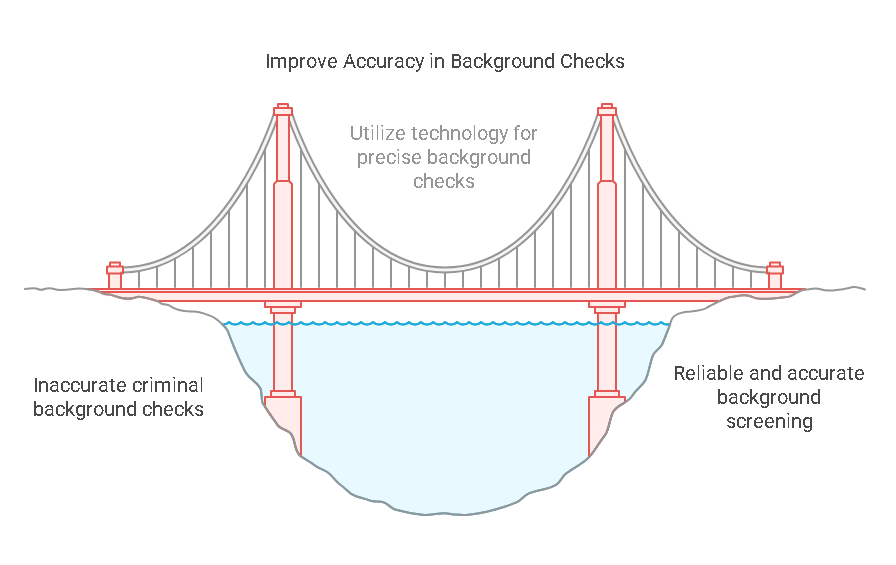
Criminal background checks are essential tools in ensuring that individuals are trustworthy and suitable for roles, housing, or other critical responsibilities. However, when inaccuracies occur, they can lead to serious consequences for both the individual and the organization. Part 2 of this article dives deeper into identifying and correcting inaccuracies in criminal background checks, best practices for employers, and how technology can help improve accuracy. Furthermore, we will highlight how Precisehire provides reliable background check services to ensure accuracy in these crucial screenings.
How to Identify Inaccuracies in a Background Check
Before correcting an inaccurate criminal background check, the first step is identifying the errors. Here’s a step-by-step approach for individuals and employers to follow to ensure the accuracy of the check:
- Cross-Check Information Against Personal Records
The individual should compare the background check report against their own personal records. It’s essential to verify basic personal information such as name, date of birth, address history, and any previous arrests or convictions listed. If there are any discrepancies—such as an unfamiliar address or an incorrectly spelled name—it may indicate that there’s a problem with the check. - Request a Copy of the Background Check Report
Employers and individuals have the right to request a copy of the background check report from the screening company. Most reputable companies will provide a copy upon request, and this is critical in the process of reviewing the information for errors. - Notifying the Screening Company of Errors
If an individual notices discrepancies or believes that an error has been made, they should immediately notify the screening company. It is important to request that they review the report and make necessary corrections. Accurate reporting is not only a matter of fairness but also a legal obligation for the companies providing these services. - Review Third-Party Data Providers
If a background check company relies on third-party data providers, cross-checking the information with these providers may also help identify discrepancies. This may include verifying police reports, court documents, or county-level databases.
Steps to Correct an Inaccurate Criminal Background Check
Once inaccuracies have been identified, it is essential to take the necessary steps to correct them. The correction process involves several stages that require attention to detail and prompt action.
- Contact the Background Check Provider
The first step is to reach out to the background check provider. This may be a private company or a government agency. They will typically have a process in place for disputing incorrect information. Individuals should be ready to provide supporting documentation, such as a copy of their birth certificate, driver’s license, or other official records, to prove their identity. - Submit Supporting Documents
In some cases, an individual may need to submit supporting documents to verify their claims. For example, if a person’s criminal record is incorrect due to mistaken identity, they may need to provide proof that they are not the person listed in the background check. Common supporting documents include court records, police reports, or any official documents that demonstrate that the criminal charges have been dismissed, expunged, or were never applicable. - Follow Up on Corrections
Once corrections have been submitted, it is crucial to follow up regularly with the background check company to ensure that the necessary updates have been made. This may involve checking the background check report again after some time to ensure that the information is corrected and updated. - Legal Help for Disputes
In more complex cases where the dispute involves identity theft or mistaken records, individuals may need to seek legal help. An attorney specializing in criminal law or identity theft can help navigate the legal challenges involved in correcting the report. In certain situations, the assistance of a legal professional can expedite the correction process and ensure that the individual’s rights are protected.
Best Practices for Employers to Prevent Inaccurate Background Checks
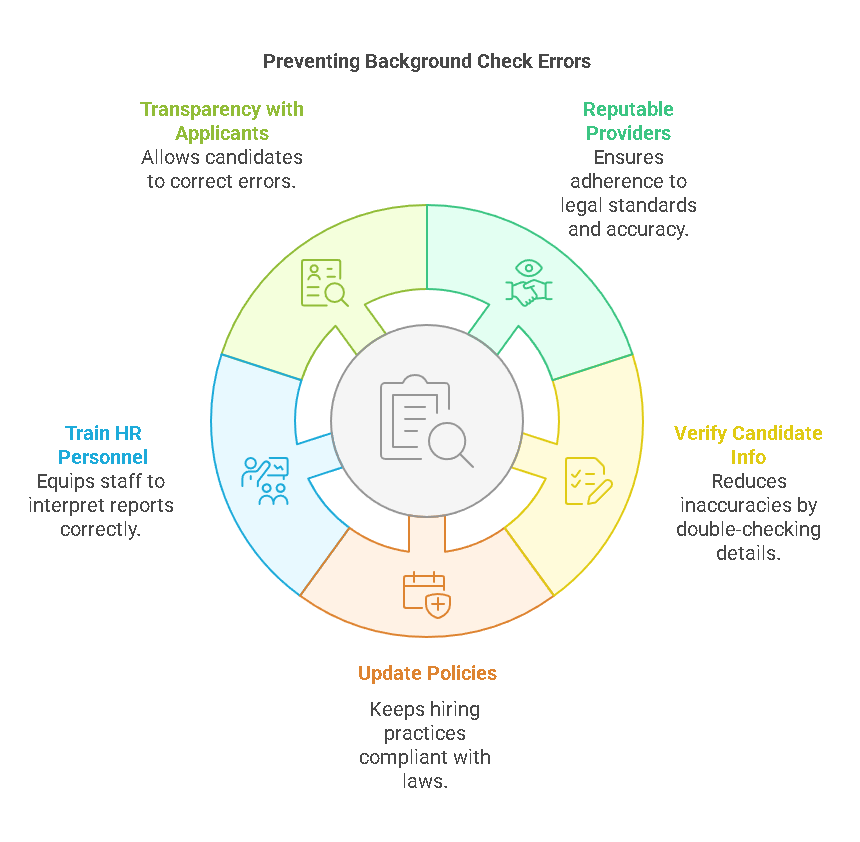
For employers, preventing inaccuracies in background checks is a critical aspect of making informed hiring decisions. Employers must take proactive steps to reduce the likelihood of errors and ensure that the hiring process remains compliant with relevant laws and regulations.
- Work with Reputable Background Check Providers
Employers should always choose reliable and accredited background check providers to conduct screenings. Reputable providers adhere to legal standards and ensure accuracy in their reports. Additionally, it’s essential to check if the provider follows the Fair Credit Reporting Act (FCRA), which mandates accuracy, transparency, and consumer protection in background checks. - Verify Candidate Information
Before initiating a background check, employers should verify the accuracy of the information provided by candidates. This includes double-checking the applicant’s full name, date of birth, social security number, and address history. Inaccuracies in the information provided can lead to incorrect background check reports. - Regularly Update Policies
Hiring and background check policies should be regularly reviewed and updated to stay in line with changes in the law. This includes understanding new requirements for background checks at both the state and federal levels. Employers should also keep up-to-date on policies around “ban-the-box” laws, which affect how criminal history is considered in hiring decisions. - Training HR Personnel
It’s vital to provide proper training for HR personnel on how to interpret background check reports. Misunderstandings of the results can lead to unnecessary legal and ethical issues. HR staff should be equipped to identify discrepancies, handle disputes, and know how to correct mistakes in a compliant and fair manner. - Transparency and Communication
It’s also important for employers to communicate openly with applicants about the background check process. Providing applicants with a copy of the background check before making any decisions gives them a chance to address potential errors before they affect their candidacy.
The Role of Technology in Improving Accuracy
In recent years, technology has played a significant role in improving the accuracy and reliability of criminal background checks. As background checks become more data-driven, companies can take advantage of advanced technologies like Artificial Intelligence (AI) and machine learning (ML) to improve the accuracy of data matching and error detection.
- Automated Data Matching
AI-driven systems can analyze large sets of criminal records and quickly match individuals to their correct records. Automated systems can help minimize human error, particularly when dealing with large volumes of data. This is particularly useful in eliminating issues of mistaken identity, as the system can cross-check multiple databases with high efficiency. - Real-Time Updates
Machine learning algorithms are capable of continuously learning and improving. These technologies can automatically update records in real-time, ensuring that the most current and accurate information is reflected in background checks. This technology helps reduce issues stemming from outdated records or delayed data entry. - Enhanced Fraud Detection
With AI, background check companies can implement advanced fraud detection systems that identify suspicious patterns, such as multiple records associated with the same personal details. These systems help identify potential identity theft or other issues before they affect the accuracy of the check.
Precisehire’s Services for Accurate Background Checks
At Precisehire, we understand how critical accurate criminal background checks are for both individuals and businesses. Our background check services are designed to provide thorough, reliable, and error-free results. Here’s how we help:
- Comprehensive Background Screening
Precisehire offers a comprehensive suite of background check services, including criminal records, employment verification, credit reports, and more. We take pride in offering a meticulous and transparent screening process to ensure our clients receive the most accurate and reliable information. - Technology-Driven Accuracy
We leverage the latest technologies in data analysis and machine learning to provide accurate background checks. Our systems ensure that data is constantly updated and errors are minimized, giving both employers and job seekers peace of mind. - Compliance with Legal Standards
Precisehire ensures compliance with all relevant laws, including the Fair Credit Reporting Act (FCRA), and we regularly update our processes to reflect any changes in local, state, and federal regulations. We help businesses navigate the complexities of background checks while ensuring compliance and fairness in hiring decisions. - Dispute Resolution Support
We understand the importance of resolving discrepancies in background checks quickly and efficiently. Precisehire provides dedicated support to assist clients with any disputes or inaccuracies in the reports, offering both the tools and expertise to resolve issues promptly.
Preventing Inaccuracies in the Future
Preventing inaccuracies in background checks requires proactive measures from both individuals and employers. Here are a few steps you can take to avoid inaccuracies in the future:
- Regularly Monitor Personal Records
Individuals should regularly monitor their criminal records and other relevant personal information to ensure that it is up to date. This will help catch any inaccuracies early and address them before they become an issue. - Use Trusted Third-Party Verification Services
Employers should work with reputable third-party services, such as Precisehire, to ensure that background checks are comprehensive, accurate, and reliable. Third-party services are familiar with the latest regulations and technologies that minimize errors in background checks. - Stay Informed About Legal Requirements
Both individuals and businesses should stay informed about changing background check regulations. Understanding the legal landscape can help mitigate the risk of inaccuracies and ensure compliance with applicable laws.
Legal Aspects, FAQs, and Conclusion
Inaccurate criminal background checks can have serious consequences, not only for individuals but also for businesses and the legal system as a whole. In this final part of the article, we will delve into the legal implications of inaccurate background checks, frequently asked questions, and a conclusion that summarizes the importance of accuracy in background screening. Additionally, we will reinforce how Precisehire provides reliable and comprehensive services to address and prevent inaccuracies.
Legal Implications of Inaccurate Background Checks
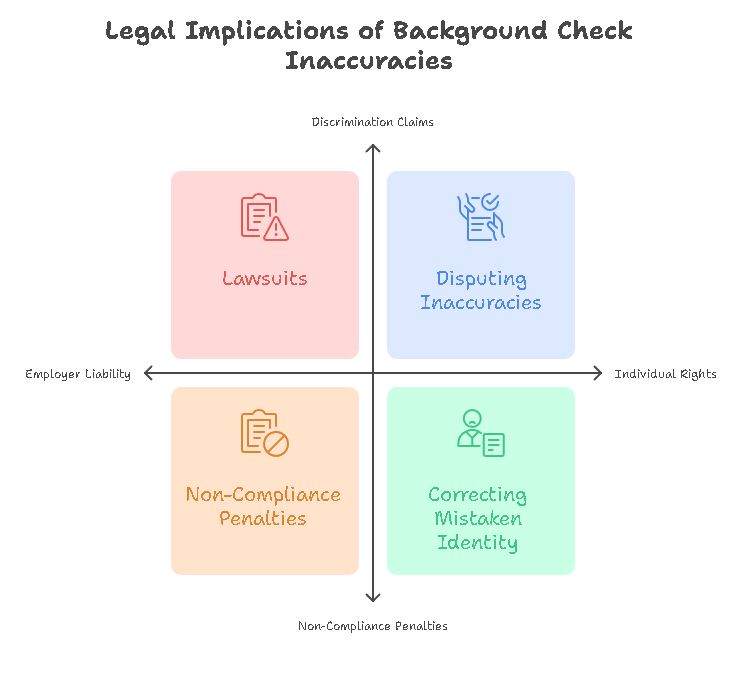
The accuracy of criminal background checks is not just a matter of fairness and transparency; it also carries significant legal implications for both employers and individuals. If inaccuracies are not corrected, both parties may face legal consequences.
- Employer Liability
Employers who use criminal background checks in the hiring process must adhere to various federal, state, and local laws, including the Fair Credit Reporting Act (FCRA). If an employer relies on an inaccurate background check to make hiring decisions, they may be in violation of these laws.Legal Consequences- Lawsuits: Individuals who are adversely affected by inaccurate background checks can file lawsuits against employers for damages. This could include claims of defamation, wrongful termination, or violation of their rights under the FCRA.
- Non-Compliance Penalties: Employers who do not follow proper procedures for using criminal background checks, such as failing to provide a copy of the report to the applicant or not allowing them the opportunity to dispute inaccuracies, can be subject to significant fines. Non-compliance with FCRA provisions can also lead to penalties imposed by government agencies.
- Discrimination Claims: Inaccurate criminal background checks may also lead to claims of discrimination if the errors disproportionately affect certain groups of individuals based on race, ethnicity, or other protected characteristics. Employers must ensure that their background check policies do not inadvertently lead to discrimination.
- Individuals’ Rights Under the FCRA
Under the Fair Credit Reporting Act (FCRA), individuals have certain rights when it comes to criminal background checks. These include the right to be notified if a background check was used to make a hiring or credit decision, the right to dispute inaccuracies, and the right to receive a copy of the background check if requested.- Disputing Inaccuracies: If an individual discovers inaccuracies in their criminal record, they have the legal right to dispute the information. The FCRA requires that background check companies investigate any reported errors within 30 days and provide the individual with a corrected report.
- Correcting Mistaken Identity: In cases where an individual’s criminal record is incorrect due to mistaken identity or identity theft, they can work with the background check company to resolve the issue. Failing to correct these errors can lead to personal and professional harm for the individual, including loss of job opportunities and reputational damage.
- The Impact on Legal Systems
Inaccurate criminal background checks undermine the integrity of the justice system. When a criminal background check is incorrect, it can lead to the wrongful arrest, conviction, or exclusion of an individual based on erroneous information. This not only causes harm to the individual but can also erode public trust in the criminal justice system.- Court Cases and Legal Precedents: Inaccurate criminal background checks can lead to lengthy legal battles, including lawsuits against government entities, employers, and background check companies. For example, there have been numerous cases where individuals have been wrongly excluded from job opportunities due to mistakes in their criminal background checks. These cases have led to changes in laws and regulations surrounding criminal record reporting and background check procedures.
- Federal and State Regulations
Various laws govern how criminal background checks must be conducted and used. At the federal level, the FCRA provides guidelines for using background checks in hiring and credit decisions. On the state level, Ban the Box laws and Fair Chance Hiring laws have been enacted to limit the use of criminal history in employment decisions, particularly for certain types of crimes or after a specified period. Employers must stay informed of these regulations to avoid legal pitfalls.
Frequently Asked Questions (FAQs)
What should I do if I find errors in my criminal background check?
If you find errors in your criminal background check, you should immediately dispute the inaccuracies with the background check company. You have the right to request a copy of the report and submit any supporting documentation that proves the error. Under the Fair Credit Reporting Act (FCRA), the company is required to investigate the issue within 30 days.
How long does it take to correct inaccuracies in a background check?
The correction process can vary depending on the complexity of the error and the responsiveness of the background check company. Typically, once you file a dispute, the company must investigate and provide you with the results within 30 days. However, resolving more complex issues, such as mistaken identity, may take longer.
Can employers legally reject me due to inaccurate information?
No, employers cannot legally reject you solely because of inaccurate information in your background check. Under the FCRA, employers must give you a chance to dispute any negative information before making a final decision. If you can prove that the information is inaccurate, the employer is obligated to correct the record and reconsider their decision.
What are my rights under the FCRA if my background check is incorrect?
Under the FCRA, you have the right to dispute any inaccuracies in your background check. The background check company must investigate the error and provide you with an updated report. Additionally, if the company fails to correct the error, you may be entitled to compensation for damages resulting from the inaccuracy.
How can I ensure my criminal record is accurate before applying for jobs?
Before applying for jobs, it’s a good idea to request a copy of your criminal record from the relevant authorities to ensure that all information is correct. Regularly checking your records helps prevent errors from affecting your job prospects. You can also work with reputable background check providers, like Precisehire, to perform a comprehensive screening before you apply.
Conclusion
Inaccurate criminal background checks can have profound consequences on both individuals and organizations. Employers may face legal risks, while individuals may lose valuable job opportunities or experience reputational damage. However, the legal framework surrounding background checks, particularly under the Fair Credit Reporting Act (FCRA), helps protect individuals and ensures that they have a right to dispute inaccuracies and correct errors. Employers must ensure that they follow the law and provide fair treatment to all candidates.
Precisehire is committed to helping both individuals and businesses ensure the accuracy and reliability of criminal background checks. By providing comprehensive, legally compliant services and leveraging advanced technologies, we help minimize the risk of errors and ensure fair and transparent hiring practices.
It’s essential for employers to stay informed about regulations, use trusted screening providers, and allow applicants to dispute inaccuracies. Individuals, on the other hand, must take proactive steps to monitor and correct their criminal records. With Precisehire, both individuals and businesses can trust that their background checks are accurate, thorough, and compliant with all relevant laws.
